Powerful quake kills at least four, paralyses Japan's Hokkaido
The quake knocked out power to 5.3 million residents
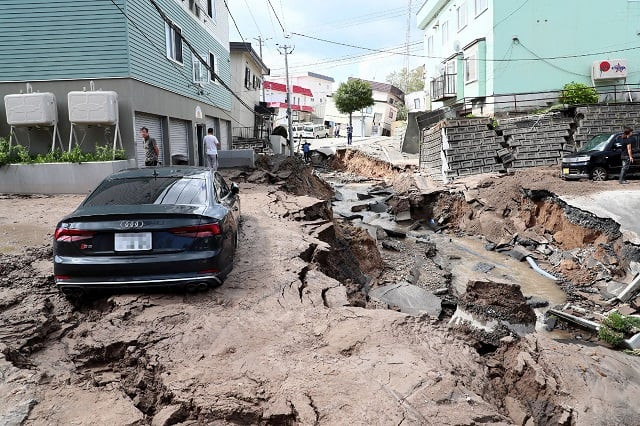
A car is seen stuck on a road damaged by an earthquake in Sapporo, Hokkaido PHOTO: AFP
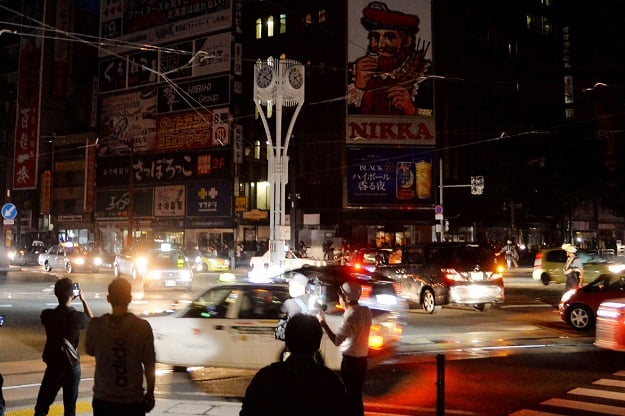 People commute during a blackout in Sapporo, Hokkaido PHOTO: AFP
People commute during a blackout in Sapporo, Hokkaido PHOTO: AFPThe quake, the latest episode in a miserable summer of natural disasters in Japan, knocked out power to all of Hokkaido’s 5.3 million residents.
Public broadcaster NHK said the death toll had doubled to four and that six people were found in cardiopulmonary arrest, a term commonly used in Japan before death is formally confirmed. Another 120 were injured after the 6.7-magnitude quake struck before dawn.
Prime Minister Shinzo Abe said 25,000 Self-Defense Force troops would be deployed for rescue operations.
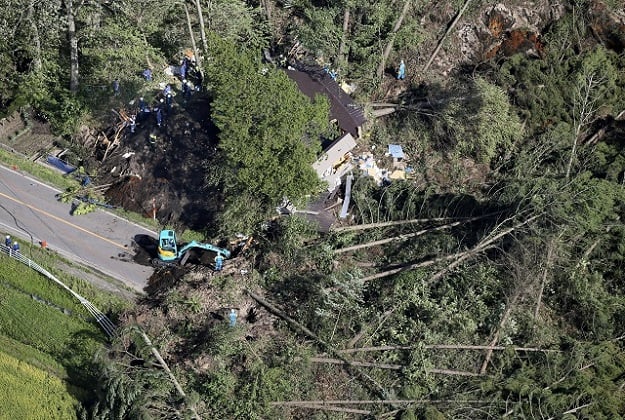 Police officers and rescue workers search for survivors from a building damaged by a landslide caused by a powerful earthquake in Atsuma town in Japan's northern Island of Hokkaido PHOTO: REUTERS
Police officers and rescue workers search for survivors from a building damaged by a landslide caused by a powerful earthquake in Atsuma town in Japan's northern Island of Hokkaido PHOTO: REUTERSAerial footage showed dozens of landslides exposing barren hillsides near the town of Atsuma in southern Hokkaido, with mounds of reddish earth and toppled trees piled up at the edge of green fields. The collapsed remains of what appeared to be houses or barns were scattered about.
“It came in four big jerks - bang! bang! bang! bang!” one unidentified woman told NHK. “Before we knew it our house was bent and we couldn’t open the door.”
The entire island lost power for the first time since Hokkaido Electric Power Co was created in 1951 when the utility conducted an emergency shutdown of all its fossil fuel-fired power plants after the quake. It said almost 12 hours later power was restored to parts of Sapporo, Hokkaido’s capital, and Asahikawa, its second-most populated city.
All trains across the island, which is about the size of Austria, were also halted.
The government said there was damage to Hokkaido Electric’s Tomato-Atsuma plant, which supplies half the electricity to the island’s 2.95 million households. It could take a week to restore power fully to all residents, Industry Minister Hiroshige Seko said.
Abe’s Liberal Democratic Party begins a leadership contest on Friday but said there would be no campaigning through to Sunday. Abe and rival Shigeru Ishiba both canceled campaign media appearances slated for Friday.
Television footage from the southeastern part of Sapporo showed crumbled roads and mud flowing onto a main street. Police directed traffic because signal lights were out while drink-vending machines, ubiquitous in Japan, and most ATMs were not working.
“Without electricity, there’s nothing I can do except to write prescriptions,” a doctor in Abira, the town next to Atsuma, told NHK.
The quake hit at 1808 GMT Wednesday at a depth of 40 km, with its epicenter about 65 km southeast of Sapporo, according to the Japan Meteorological Agency (JMA). It registered a strong 6 on Japan’s 7-point quake scale.
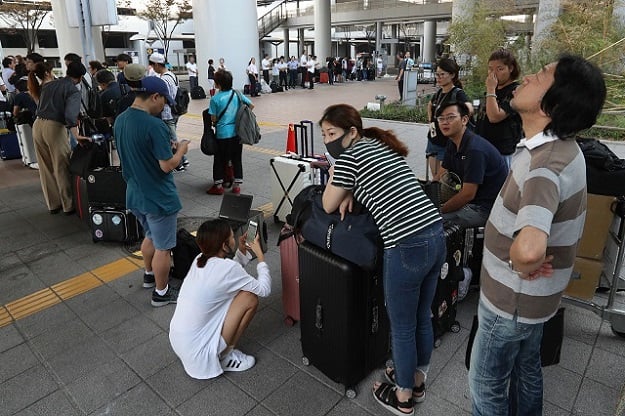 Passengers stranded at the Kansai International Airport PHOTO: AFP
Passengers stranded at the Kansai International Airport PHOTO: AFPIt struck near Hokkaido’s main airport, New Chitose Airport, which would be closed for at least Thursday. Roof tiles and water could be seen on the terminal floors.
Chitose airport is a major gateway to the island, known for its mountains, lakes and abundant farmland and seafood. More than 200 flights and 40,000 passengers would be affected, Kyodo News agency said.
The closure comes just days after Kansai Airport, another major regional hub, in western Japan, was shut by Typhoon Jebi. The airport’s operator said it would resume some domestic flights on Friday.
The Tomari Nuclear Power Station, which has been shut since a 2011 earthquake and tsunami, suffered a power outage but officials said it was cooling its spent nuclear fuel safely.
Farming, tourism and other services are big economic drivers on Hokkaido, which accounts for just 3.6 percent of Japan’s GDP, but there is some industry. Kirin Brewery and Sapporo Breweries both said factories were shut by the power outage.
A fire that broke out at a Mitsubishi Steel Mfg Co (5632.T) plant in the city of Muroran after the quake was extinguished with no injuries.
A series of smaller shocks, including one with a magnitude of 5.4, followed the initial quake, the JMA said. Residents were warned to take precautions for potential major aftershocks in coming days.
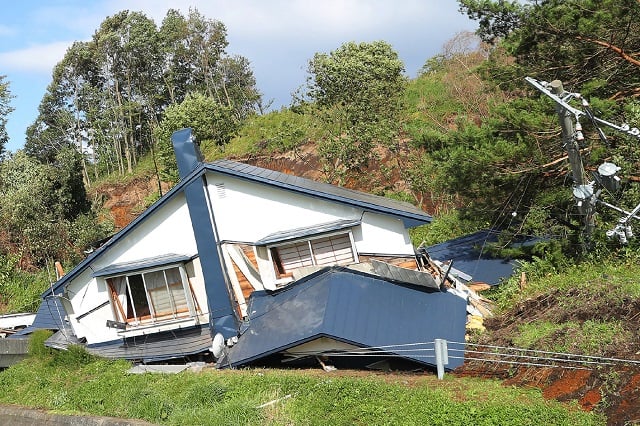 A house is damaged by landslides caused by an earthquake in Atsuma town, Hokkaido PHOTO: AFP
A house is damaged by landslides caused by an earthquake in Atsuma town, Hokkaido PHOTO: AFPJapan is situated on the “Ring of Fire” arc of volcanoes and oceanic trenches that partly encircles the Pacific Basin.
A 9.0 magnitude earthquake, the most powerful ever recorded in Japan, struck on March 11, 2011, off its northeastern coast, triggering a tsunami that devastated communities along the Pacific coast and killed nearly 20,000 people.
The tsunami also damaged the Fukushima Daiichi nuclear power plant, leading to a series of explosions and meltdowns that spewed radiation into the air and ocean.
Saturday marked the 95th anniversary of the Great Kanto earthquake, which had a magnitude of 7.9 and killed more than 140,000 people in the Tokyo area. Seismologists have said another such quake could strike the city at any time.



















COMMENTS
Comments are moderated and generally will be posted if they are on-topic and not abusive.
For more information, please see our Comments FAQ